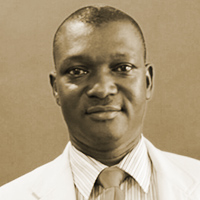Bio
J. Shola Omotola obtained his PhD in comparative African governance and politics from the University of Ibadan, Nigeria. He is currently a professor of political science at the Federal University, Oye Ekiti (FUOYE), where he is the director of Research and Development and head of the Department of Political Science. Recently a visiting professor at the Bayreuth International Graduate School of African Studies (BIGSAS), University of Bayreuth, Germany, he previously worked as a consultant in the Office of the Director General and Head, Socio-Political Unit of the Department of Research and Training, National Institute for Legislative Studies (NILS), National Assembly, Abuja, Nigeria (October 2015–October 2016); and was also senior lecturer in political science at Redeemer’s University, Nigeria. His primary research interests are in Comparative and African democratization studies. His other research interests include oil and environmental politics in the Niger Delta, security and post-conflict peacebuilding, and development studies. He has many publications in refereed books and journals, including African Affairs and Commonwealth and Comparative Politics. He has also co/authored and/or co-edited five books, including Nigeria’s 2015 Elections: Continuity and Change in Electoral Democracy (Palgrave Macmillan, UK, 2017); Horror in Paradise: Frameworks for Understanding the Crises of the Niger Delta Region of Nigeria (Carolina Academic Press, USA, 2014); The Legislature and Governance in Nigeria (John Archers Publishers, Ibadan, 2014); and The State in Contemporary Nigeria: Issues, Perspectives and Challenges (John Archers Publishers, Ibadan, 2015).
Group Members:
Abosede Babatunde (APN Individual Research Grant recipient 2016), University of Ilorin, Nigeria
Akachi Odoemene (APN Individual Research Grant recipient 2013), Federal University Otuoke, Nigeria
Richard Alemdjrodo (APN Individual Research Grant recipient 2016), University of Lomé, Togo
Fatma Ibnouf (APN Individual Research Grant recipient 2016; Book Manuscript Completion Grant recipient 2017), University of Khartoum, Sudan
Aloysius Ngalim (APN Individual Research Grant recipient 2013), University of Buea, Cameroon
Patricia Bontogho, University of Fada N’gourma, Burkina Faso

